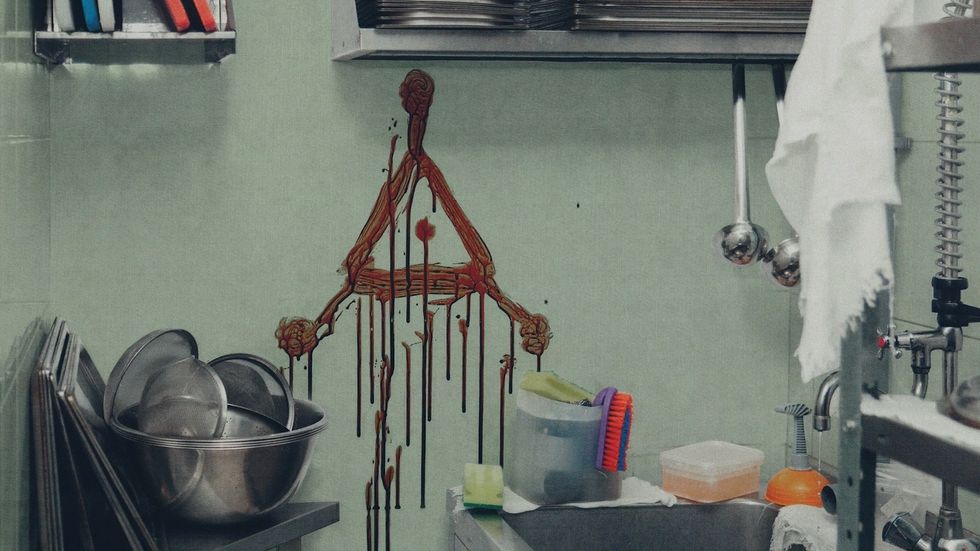
When exactly was it that the true crime genre really took off, huh? Documentaries like Paradise Lost and The Thin Blue Line have existed for decades, but it seems within the last recent decade our darkest interests have piqued and popularized it ad naseum.
While not quite mockumentary, Strange Harvest: Occult Murder in Inland Empire finds way to tell an intricately fabricated, documentary-style true crime narrative in an interesting and engaging way. Strange Harvest follows detectives Joe Kirby (Peter Zizzo) and Lexi Taylor (Terri Apple) in pursuit of occultist serial killer, Mr. Shiny (no spoilers!). Crafted entirely with impressively shot news reels and crime scene footage, it took this guy (me) a second to realize it wasn’t a real life true crime doc.
Strange Harvest premieres at revered genre festival Fantastic Fest September 22, so it’ll be awhile before it will be available to the public. However, if you’re in Austin, TX check it out! If not, enjoy this interview with writer-director Stuart Ortiz in the mean time to et your fictional true crime fix.
Editor’s note: the following quotes from Stuart Ortiz are edited for length and clarity.
Making a (Fictional) Murderer

“I constructed [the mythology] myself. I knew going into it that I was going to need a mythology, and it was important to me to get all the world building aspects. So I worked out a whole mythology with internal logic of the movie that made sense for the killer’s (Mr. Shiny) mind.
Mr. Shiny is a Frankenstein monster of a bunch of different [real life serial killers]. He has obvious similarities to Zodiac, who would write these cryptic letters to the police. That was very Zodiac inspired. I think if I were to relate him really to anyone, any real life guys, it would probably be like David Berkowitz, the son of Sam Killer. Or maybe this guy Herbert Mullen, who isn’t super well-known, but he was a serial killer that was killing people because he believed he was telepathically talking to his dead father, and his dead father told him if he didn’t kill people, earthquakes were going to destroy California.
So anyway, both these guys thought they were talking to a higher power and they had some higher purpose, and that’s similar to Mr. Shiny.”
The Secret of High Concept, Low Budget Features
“This project was very much conceived to be something that could be made super low budget.
I mean, the big problem for any indie filmmaker is you’re trying to come up with that high concept, low budget idea. Everyone’s searching for the next Blair Witch Project, or Paranormal Activity, or whatever it is. So this idea to me, it was like, we can shoot these interviews and then everything else, and if everything goes wrong during the main shoot, I could pretty much figure out [a solution]. That’s the concept with this movie.
I encourage people to try to search for your own version of that idea. There’s always an idea out there waiting to be done that doesn’t necessarily take a ton of money or any money at all. You just have to look for it.”
Crafting Fake News

“It depends on the material.
Anytime that there’s a newscaster directly talking about our story, we shot that deliberately and methodically. Sometimes on the schedule when we were shooting, it would be half the day for two seconds of a newscast or whatever. We went to great lengths to capture some [some scenes]—sometimes we would spend half a day just setting up in a studio to do news clips.
It’s really important to [make that look legitimate]. Especially with news footage—everyone has seen news footage. We know what news footage looks like. It always still blows my mind when a hundred million dollar movie will have the junkiest, fakest looking news footage.”
The Key to Staging Fictional True Crime? Practical Effects, Baby

“I got lucky.
I worked with a really talented makeup artist, this guy named Josh Russell, who’s really legit. He worked on The Ritual and the new Hellraiser and stuff, and we got lucky and he agreed to work with us for us for some reason. He came in with these incredibly disturbing, realistic dummies that we were able to put up.
The approach to Strange Harvest was so weird because, usually with a movie, you spend all this time setting up your scene, and then you spend all this time shooting your scene. We only did one of those parts. We did the first part, spending a lot of time setting up our scene, and then sometimes, I mean, literally it would be 10 minutes going around with a still camera, because that’s all that we needed to get in that moment. Sometimes it was just photographs, basically.
So it was all about spending the time, but having the time, too. We planned that we would have hours to methodically [the camera] around, because we wanted to be able to have time to experiment and get different angles and make sure everything looked right.”
How to Cast for Fiction Real People

“Those are all people that we knew.
There’s a good mix that are friends of someone that was working on the movie. My sister is interviewed [at one point]. There’s someone that’s interviewed who is a genre legend in and of himself, an actor named John Philbin. He’s in Point Break, Tombstone, Return of the Living Dead, and Children of the Corn. He’s a little fun cameo that we have in there.”
Author: Grant Vance
This article comes from No Film School and can be read on the original site.
